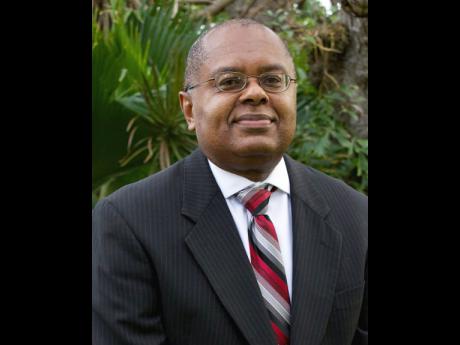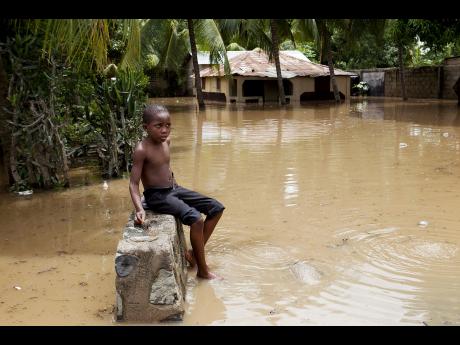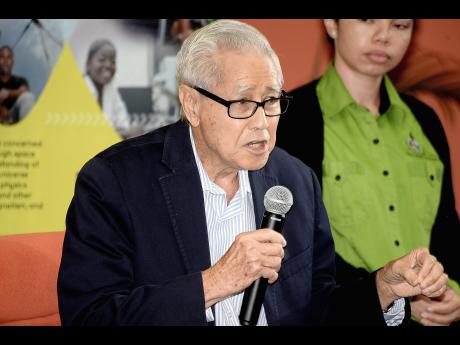Earth Today | Stronger push needed for greenhouse gas emission cuts
WITH THE special report on global warming of 1.5 degrees Celsius revealing that the world at that temperature is one that is in much better shape than at two degrees, some Caribbean stakeholders are insisting on the need for a renewed push for steep greenhouse gas (GHG) emission cuts, particularly from developed countries.
For James Fletcher - former minister of sustainable development in Saint Lucia, and one who has been at the forefront of negotiations at the international climate talks - Caribbean small island developing states (SIDS) have, in recent times, been too focused on tapping into climate finance.
"We have shifted the focus too much to the issue of climate finance. It is easy to understand why some of our heads of government have strengthened the call for more access to climate finance in the aftermath of the devastating 2017 Atlantic hurricane season. But climate finance is not the only thing for which we should be lobbying," he said.
"If we do not succeed in getting industrialised countries to drastically reduce their emissions of carbon dioxide and other greenhouse gases, and consequently bend that global temperature curve sharply down-ward, the climate finance that we access will probably just allow us to keep our heads afloat, literally and figuratively, from an onslaught of alarming sea level rise; ocean acidification, more intense and prolonged droughts; more frequent flooding; higher incidence of vector-borne diseases; deadly heat waves; suffocating and economically and ecologically damaging forest and bush fires; and more severe hurricanes," predicted Fletcher, now a consultant on sustainable develop-ment issues, including climate change and renewable energy, for SIDS.
Nobel Laureate shares concerns over Caribbean priorities
Nobel laureate Professor Anthony Chen also has grave concerns over the apparent shift in priorities for Caribbean SIDS, while noting the need for a look at emissions even within islands.
"I am most concerned about this inadequacy, and have been for quite a while. I think that there are several reasons for this. One is the attitude that we are insignificant emitters. We are not. Trinidad is one of the highest emitters in the world because of its petrochemical industry, and Jamaica compares to Uruguay and Georgia in terms of emissions of greenhouse gases," he told The Gleaner.
"The fact is that all countries of the world have to reduce emissions very quickly, and the Caribbean countries that have been strong advocates of climate change action should be leaders in this regard, but, sadly, we are laggards. Another reason is the emphasis on adaptation (reducing the effects of the impacts) at the expense of mitigation (reducing greenhouse gases). I have seen it advocated by one of our leaders that the way to go is to have private enterprise invest in renewables and use most of the funds allocated by the Green Climate Fund for adaptation," he added.
According to Chen, former head of the Climate Studies Group, Mona, this is "very short sighted.
Private Sector
"Private enterprise will, and can only, invest in small energy plants up to a total 30 per cent of our energy needs. For full mitigation of greenhouse gases, we need to store the energy so that it can be used when there is no wind or sunshine. This can only be done by the use of storage devices, such as batteries or pumped storage. Because of the enormity and expense of such projects, we need the combined effort of Government, with funding from the Green Climate Fund and the World Bank, etc, and private enterprise," he said.
The 1.5 report - for which a Summary for Policymakers was approved in October at the meeting of the Intergovernmental Panel on Climate Change, whose scientists worked on the document - clearly establishes that 1.5 degrees Celcius is the better option as a temperature goal than two degrees, but makes it clear that to get there will prove a steep climb.
"To limit temperature rise to 2 degrees C, the world as a whole has to peak emissions of greenhouse gases by about 2020, and there should be no emissions by about 2070. To limit temperature rise to 1.5 degree C, much more stringent requirements are needed," explained Chen.
"Peaking by 2020 or earlier means that no new fossil fuel plants should be added after that date. The option for the Caribbean would be renewables. The 2070 or earlier date means that all fossil fuel plants should be retired by then," he added.



